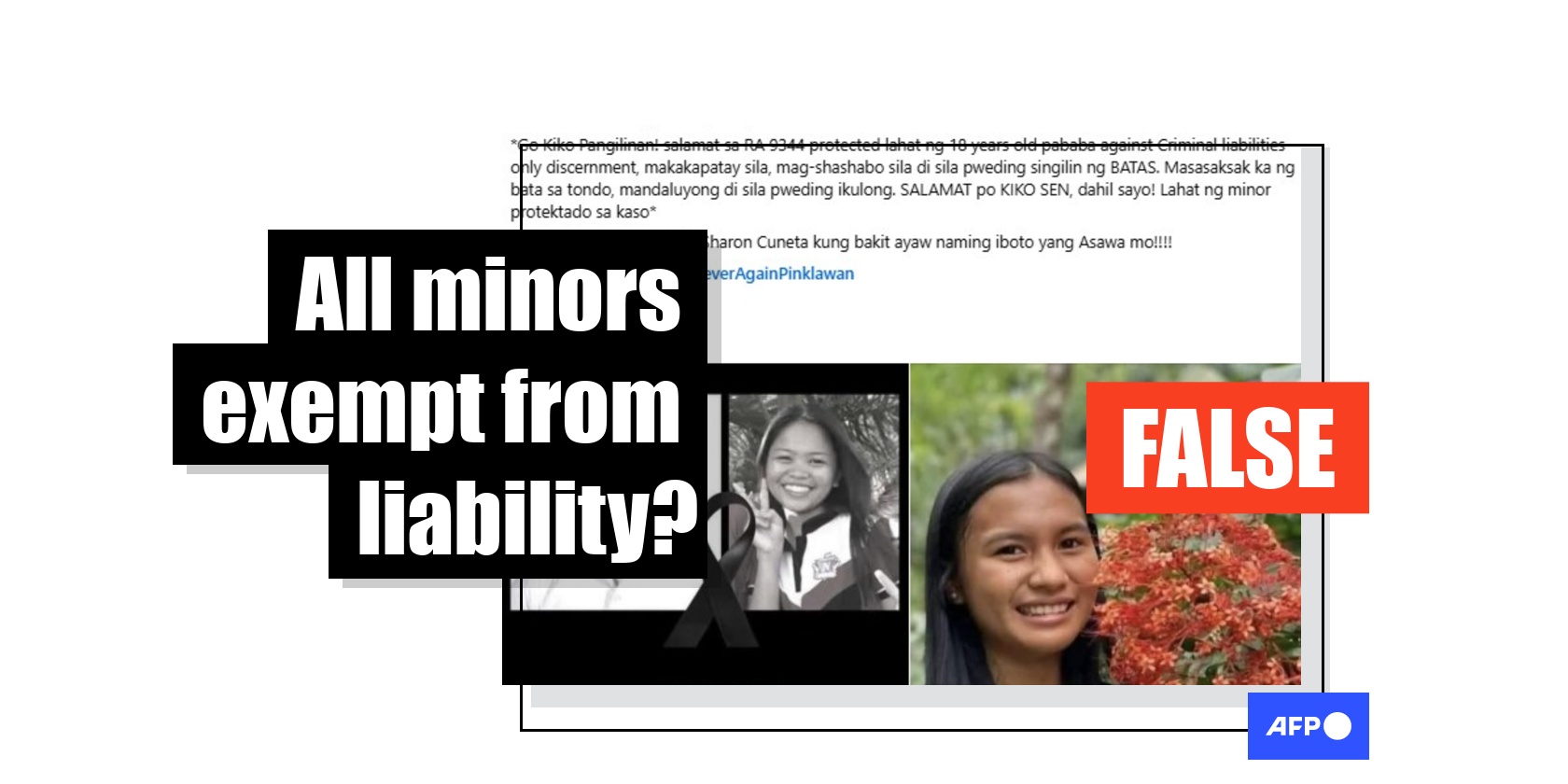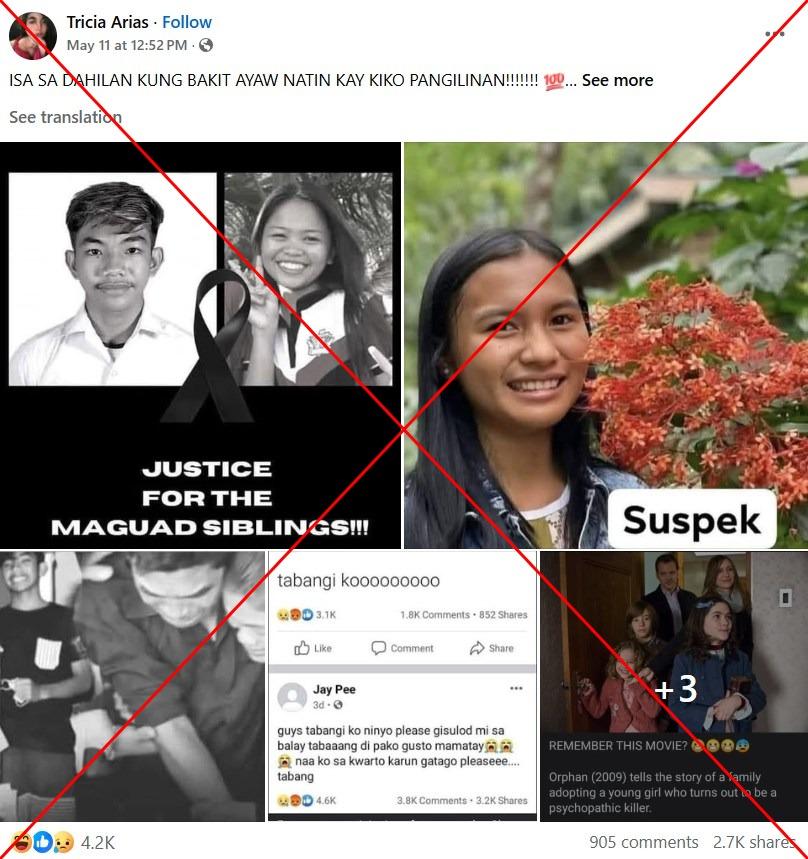
Inaccurate claims about Philippine juvenile justice law surface online
- Published on June 17, 2025 at 10:35
- 3 min read
- By Ara Eugenio, AFP Philippines
"Go Kiko! Thanks to RA 9344, all 18 years old and below are protected against criminal liabilities only discernment (sic), they can kill, use drugs and they won’t be held accountable by the LAW," reads a Facebook post published May 22, 2025.
"You could be stabbed by a child in Tondo or Mandaluyong, and they can’t be jailed. THANK YOU, Senator KIKO! Because of you, all minors are protected from prosecution."
The post refers to Senator Francis Pangilinan and the Juvenile Justice and Welfare Act of 2006 (RA 9344), which he authored (archived link).
It also references the 2021 murder of the Maguad siblings in Cotabato, where 18-year-old Gwynn and 16-year-old Louis were stabbed to death by their 17-year-old adopted sister (archived link). The suspect initially posed as a survivor before later admitting she committed the crime with a friend, also a minor.
The post appears to suggest the suspects were not fully held accountable due to their age, framing the law as overly lenient toward youth offenders.
"The suspects should be imprisoned for life. The justice system in the Philippines really is something," reads the caption.

After his failed 2022 vice presidential bid, Pangilinan made a political comeback as an independent senatorial candidate in the May 12 midterm elections, which saw disappointing results for President Ferdinand Marcos’s party (archived link).
If Vice President Sara Duterte's impeachment trial extends into the next Congress, Pangilinan will join the Senate jury in the case against his former opponent and Marcos’s former ally turned political rival, who could be permanently barred from public office if convicted.
The claim spread widely across social media, triggering reactions from users who believed the law grants blanket immunity to juvenile offenders.
"I will never vote for him," one user said.
Another commented: "Hopefully this law gets repealed. Because of this law minors can easily commit crimes."
But legal experts told AFP the claims misrepresent the scope of the law.
'Not automatically exempt'
The Juvenile Justice and Welfare System, established under a 2006 law sponsored by Pangilinan and amended in 2013, outlines specific provisions for holding minors accountable depending on their age and whether they acted with discernment (archived link).
"The law clearly establishes that minors are not automatically exempt from criminal liability," Maria Luisa Villarin, a lawyer and deputy executive director of the Humanitarian Legal Assistance Foundation (HLAF), told AFP on May 30 (archived link).
Citing section 3, Villarin explained that children 15 and below are exempt from criminal liability under all circumstances but remain civilly liable and subject to intervention programs depending on the offence.
Meanwhile, "children above 15 but below 18 may be held criminally liable if they are proven to have acted with discernment, especially when the crime is punishable by more than 12 years of imprisonment, or if diversion is not appropriate or unsuccessful," she said.
Rommel Alim Abitria, a criminal law expert and former executive director of HLAF, also told AFP on June 5 that the post "misrepresents both the intent and actual provisions of the law" (archived link).
He said the law had improved the juvenile justice system by creating ways to handle repeat and serious offences, including placing children who commit heinous crimes in intensive rehabilitation, while ensuring accountability matches their age and capacity for reform.
"It’s important to note that this was never about excusing wrongdoing -- it’s about making sure children are held accountable in a way that reflects their age, capacity and potential for reform," he said, noting that before the law was passed, children as young as nine were jailed as adults, exposing them to abuse, criminal influence and trauma.
Abitria said the Maguad siblings' case is a "powerful and painful example that accountability is very much possible" under the law.
"Two minors were found to have acted with discernment -- that is, the court was convinced they understood the nature and consequences of their actions. As a result, they were tried, found guilty and sentenced to 30 years of imprisonment," he said.
Philippine news outlet Inquirer.net reported in May 2022 that the court denied parole for both minors and that they were placed in the custody of the social welfare and development agency upon conviction (archived link).
The law mandates that children be placed in youth care facilities offering intensive intervention programs for serious or repeat offenders before being transferred to an adult correctional facility after turning 18.
AFP has debunked more misinformation on the Philippine midterm elections here.
Copyright © AFP 2017-2026. Any commercial use of this content requires a subscription. Click here to find out more.
Is there content that you would like AFP to fact-check? Get in touch.
Contact us
